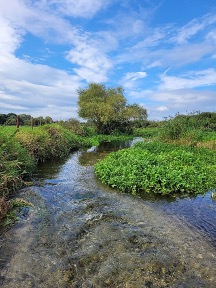ENDS REPORT, Shosha Adie, 15 Aug 2023
https://www.endsreport.com/article/1833331/salmon-numbers-below-long-term-average-uk-chalk-streams
The number of salmon returning to three protected chalk streams in the UK continues to be below the long-term average, causing concern amongst conservationists.
In salmon counter data reports for the river Test and Itchen, sent to the Missing Salmon Alliance (MSA) by the Environment Agency (EA) and seen by ENDS, there is a continuing long term decline in salmon numbers. In both rivers, salmon numbers between January and July this year were below the long term average for this period that uses count data from 2015-2022.
In the update given at the end of July 2023 it was noted that: “The cool, wet weather has maintained river flow and, to a degree, ameliorated temperature and oxygen levels in the upper estuaries, although problematic levels have still been recorded at times.”
The EA did note that in July this year, the cumulative salmon numbers in the Itchen was, “now more than double that for the same date in 2022, while on the Test, it is around 25% higher than the 2022 equivalent”.
However, the numbers this year are still much lower than the results of 2020, a year during which less human interaction during the coronavirus pandemic lockdowns meant healthier numbers of returning salmon on the Test and Itchen, according to the MSA, whose members include the Fish Legal and the Rivers Trust.
Chalk streams are some of the rarest habitats in the world, with the majority being in England. Amongst many other species, they are a valuable habitat for Atlantic salmon, which spend most of their life at sea, but return to spawn in the same stretch of river or stream in where they hatched.
Separate data from the river Frome, collected by Game Wildlife Conservation Trust (GWCT) and published in its May 2023 issue of The GWCT Salmon and Trout research centre also found that the net upstream salmon count for the first part of 2023 was below expectations, but only marginally.
Dylan Roberts, head of fisheries at GWCT, also a member of MSA, said: “Wild Atlantic salmon populations have been declining sharply across their natural range for the last 40 years, many of the causes are driven by climate change and largely out of our control.
“However, the UK’s rivers and streams are suffering a crisis of sewage, agricultural and chemical pollution and migratory barriers which are the salmon’s nursery areas and our seas are fished with commercial nets intensively when the salmon are returning to our coastline.
“There is a huge amount that the governments can do to ensure that salmon still swim in our rivers for generations to come, but if they continue to prioritise cheap food and water over nature, as has been the case then I fear that we could lose our wild Atlantic salmon and many other species forever!”
The MSA also noted that there is increasing pressure on salmon numbers due to more frequent and intense summer heat waves, which can result in low river flow.
In July, the UK government agreed to provide protection for chalk streams in the Levelling Up and Regeneration Bill after DEFRA minister Lord Benyon agreed to bring forward an amendment tabled by Lord Trenchard.
The amendment is for “protection for chalk streams in England so as to reduce the harmful impacts of excessive abstraction and pollution and improve their physical habitat”.
According to MSA, this will be the first time specific protection for chalk streams will be written into UK law.
A Defra spokesperson said: “The latest salmon stock assessments are concerning, and we are focused on halting this decline and restoring stocks in our rivers.
“Our Plan for Water is tackling every source of pollution, including from storm overflows, agriculture, plastics, road run-off and chemicals – as well as wider pressures as a result of hotter, drier summers – to protect marine life. We are also working internationally and supporting new research to ensure future healthy salmon stocks.”


0 Comments